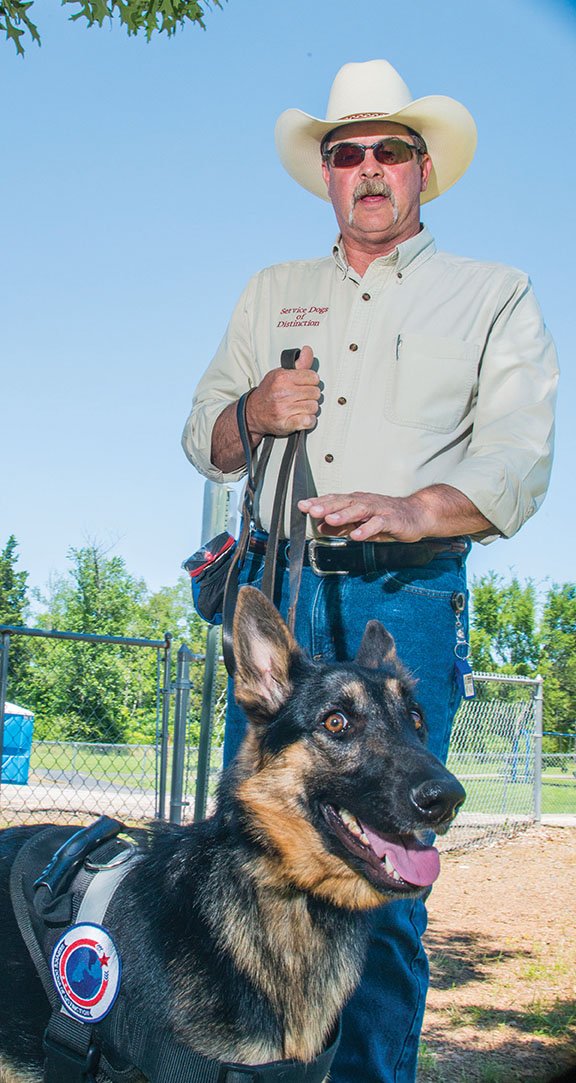ROSE BUD — By training man’s best friend, one organization is looking to give back to veterans.
Bark in the Park, a 1-mile fun walk and fundraiser in support of Services Dogs of Distinction, will take place from 9 a.m. to 3 p.m. Saturday at the track at Rose Bud City Park. Service Dogs of Distinction trains shelter and donated dogs for veterans with post-traumatic stress disorder or traumatic brain injuries.
“We look at this like we’re training superior dogs for extraordinary people,” said Don Gardner, the organization’s co-founder, president and head trainer, who lives and trains in the Mount Vernon, Rose Bud and Northwest Arkansas areas.
Gardner said that Bark in the Park was his wife’s idea, and that a friend at the Pulaski County Humane Society inspired the event as well. Registration for Bark in the Park will begin at 9 a.m. and costs $25. The walk will begin at 10 a.m. The fundraiser will have a training clinic at noon for $25, a dog costume contest at 1:30 p.m. for $5 and American Kennel Club Canine Good Citizen testing at 2 p.m. for $25.
Service Dogs of Distinction officially began in January after Gardner and two other trainers broke away from a service-dog-training organization in Northwest Arkansas. Currently, most of Service Dogs of Distinction’s veterans are residents of Northwest Arkansas, but the program aims to grow more in central Arkansas.
“When we started this up, our goal was to have two training locations to be able to serve a little better,” Gardner said. “I will be starting up training classes here in the central part of the state, hopefully, in the next few weeks.”
During the Bark in the Park training clinic, Gardner will go over operant conditioning, which is the positive-reinforcement-based training the organization uses. Gardner, a Canine Good Citizen evaluator, will also offer the Canine Good Citizen test to those who would like their dogs to have CGC titles, which reward upstanding behavior.
Gardner said he hopes to see 75 to 100 people participate in Bark in the Park, but he has no specific fundraising goal.
“We try not to look at the hard numbers,” he said. “I would be tickled if we got $1,500 — $1,500 altogether. If it was more than that, it would only be that much more of a blessing to us.”
Door prizes, concession items and silent-auction items have been donated for the event, meaning the organization has not spent any of its own money on Bark in the Park.
Gardner said Service Dogs of Distinction animals must reach a certain level in their training before they train with the veteran at everyday locations such as grocery stores, museums or “anywhere that you would normally go with your routine.” Until a dog reaches a level of proficiency in its basic skills, the dog will remain in the care of Service Dogs of Distinction until it’s ready to spend time at home with the veteran, who will be expected to bond with the dog more.
“The veteran learns to read the dog, and the dog learns to read the veterans,” Gardner said. “We want the dog to be focusing and looking at the veteran every 15 to 20 seconds.”
Gardner said service dogs provide veterans with comfort and emotional support. Dogs can be trained to wake the veteran at night if he or she is having night terrors, and they can also stand between the veteran and another person nearby to create personal space.
“Probably one of the most important things that the dog does is lower the chance of an anxiety attack or anxiety in general in the veterans,” he said.
Veterans qualify for the Services Dogs of Distinction program if they have been diagnosed with PTSD or a traumatic brain injury. Gardner said veterans interested in the program are encouraged to already be in counseling for their symptoms. They must also have discharge papers and undergo a background check, which will not necessarily eliminate them from qualifying for the program.
“Some of the things [on a background check] may have been related to the PTSD itself,” he said.
Service dogs are free to qualifying veterans, but Service Dogs with Distinction can evaluate a veteran’s dog to see if it meets necessary standards to go forward with training.
“Some of the veterans have their own dog, and if they pass evaluation, then we train with them,” Gardner said. “Not all of those make it as a prospect. If that’s the case, then we offer a dog to them.”
Gardner said that through Bark in the Park, he would like eventgoers, including children, to know that service dogs are hard at work.
“They are not a family pet,” he said. “They are not a chemical out of a bottle that alters your mood through chemical makeups that way. Most people are not aware that they don’t need to continually approach a person with a service dog and distract their dog.”
Ten veterans are currently in the Service Dogs of Distinction program, and Gardner said more applicants will soon be working with a dog they’ll call their own.
“It takes a pretty special dog to be able to do all of the things that will be required,” he said.
Staff writer Syd Hayman can be reached at (501) 244-4307 or shayman@arkansasonline.com.
